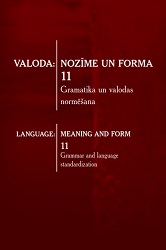Uzrunas locījumi gramatikā un valodas praksē
Forms of address and case in grammar and language use
Author(s): Andra KalnačaSubject(s): Syntax, Pragmatics, Baltic Languages
Published by: Latvijas Universitātes Akadēmiskais apgāds
Keywords: address; vocative; nominative; accusative; animateness; diminutive; language standardization;
Summary/Abstract: There is a great variety of forms of address in Latvian. Vocative, nominative, and even accusative is used both for female and male personal names, and generic nouns naming a person (e. g., tēvs ‘father’, brālis ‘brother’, māte ‘mother’, māsa ‘sister’), as well as diminutives. Although this diversity is at least partially reflected in Latvian grammar, so far there has been a lack of analysis of the standardization of this variety of forms of address. However, this is very important for language users, because in everyday life we address each other by our names, surnames, kinship, profession or position, as well as by the name of social status, not only in spoken but also in written texts. Sometimes a nominative is used instead of vocative for male personal names while a vocative is used instead of more suitable nominative for female personal names in the official communication. The article considers the issues mentioned above, reviewing the description of the forms of address in Latvian grammar, and the standardization of these forms. The review is based on the analysis of male and female personal names, and generic nouns naming a person.
Journal: Valoda: nozīme un forma
- Issue Year: 2020
- Issue No: 11
- Page Range: 63-76
- Page Count: 14
- Language: Latvian

